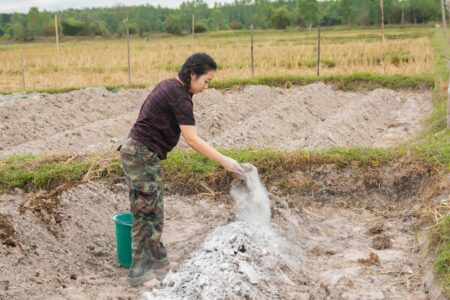Agricultural limestone and dolomite limestone are the two types of lime that gardeners and farmers use to improve soil conditions. Agricultural limestone (Ag lime) contains calcium, while dolomite lime contains calcium and magnesium. Both types of limestone are beneficial, but some farmers prefer to use dolomite to combat magnesium deficiencies in the plants. Here are some other benefits of lime:
Limestone Corrects the Soil pH
Chances are that the soil in your field or garden will become acidic over time due to several factors, including decomposition of organic material and erosion. Limestone raises the pH level to a neutral range beneficial to plants, typically between 5.5 and 6.5.
If the pH is acidic and below 5.5, or if the pH is alkaline and above 6.5, this will create a nutrient deficiency in your plants. You can improve the nutritional quality of your crops by using limestone in the recommended amount.
Limestone Raises the Effectiveness of Some Herbicides
The structure of the soil in your field or garden improves with the addition of limestone to correct the soil’s pH level. Due to this improvement, nutrients are better absorbed, and your plants can retain more water. Additionally, herbicides work more efficiently in a neutral pH-based environment and break down quicker.
Limestone Prevents Toxicities in the Soil
When the soil in your field or garden reaches an acidic pH level, certain nutrients such as aluminum, manganese, calcium, magnesium, phosphorus and iron elevate to toxic levels. Not only will limestone prevent the build-up of these nutrients, but it will safely improve the calcium level as well.
If you choose to use dolomite limestone, then both calcium and magnesium deficiencies will see improvement.
Limestone Use Increases the Farm’s Return on Investment
The recommended amount of limestone to use is results-based from a soil analysis from your fields and takes into account the climate, your crops, and the crop rotation you use each year.
Limestone enhances the quality and yield of the crops, which increases the farm’s return on investment. In Ireland, for example, limestone use in grasses raised the pH level to 6.3 and increased grass production by an extra 1.0 tonne DM/ha annually.
Limestone Use on Lawns Increases Good Bacterial Activity
Increasing the good bacteria in your soil will improve the composition of the soil. The decomposition of organic material causes the soil to become acidic over time, but limestone will help to disintegrate any organic matter, producing a porous soil. This new soil mixture allows for better water absorption and air circulation. As the root system continues to grow deeper and stronger, the plants will absorb more nutrients and water.
Applying Limestone to Crop Fields
Sending a sample of your soil for soil analysis to a laboratory will produce accurate results of the pH. Unlike using a home-based pH test kit, the analysis will also identify the type of soil in your field or garden.
The lab may provide suggestions for the amount of limestone you should use in order to shift the pH into the recommended range. If not, several states publish agriculture lime recommendations based on lime quality and other factors. The University of Kentucky published a report clarifying the bulk lime determination using two application rates as well as the estimated cost of using the amount of lime needed.
North American farmers tend to underutilize the amount of lime required to neutralize the acidity in the soil. This can result in poor quality crops and a lower yield. Consider using limestone and fertilizer to help your crops flourish and raise the efficiency of your fertilizer up to 50 percent.
Applying Limestone to Lawns
Experts recommend adding limestone to the soil while preparing for planting to ensure that it is properly distributed and maintains the appropriate depth to produce thick and colorful grass. Some gardeners lime their lawns before the first frost during fall season; they can see the results in the spring, after the absorption during the winter season.
Agricultural and dolomite limestone come in several forms, including huge blocks, pellets, and pulverized. According to the National Lime Association, the physical specifications of the different forms vary — the pelletized lime comes in one-inch pieces, for example. Pulverized lime is much smaller and passes through a No. 20 sieve. The size of crushed or pebble lime ranges from one-fourth inch to two and one-half inches.
Whichever size limestone you choose for your field or garden, use the correct lime amount combined with fertilizer to take your results to the next level.







